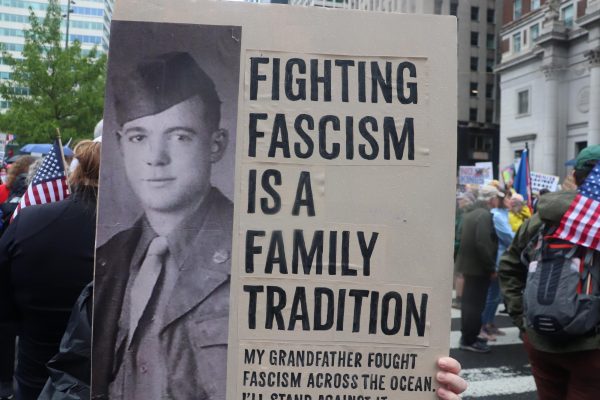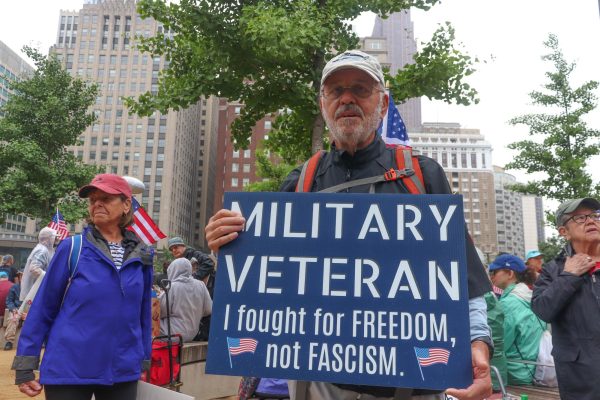Despite light rain, over 80,000 gathered on Saturday at JFK Plaza in Center City, Philadelphia, before marching to the steps of the Philadelphia Museum of Art. The crowd came together to rally against President Donald Trump and a 250th anniversary military parade held concurrently in Washington, D.C.
By 11 a.m., the plaza, also known as Love Park, was a sea of poncho-clad protesters, waving anti-Trump signs, flags, and leading chants against the president and his immigration crackdowns. Another central theme of the day was resistance to authoritarianism, which brought out Sarah Nethery, who stood near the iconic LOVE sign with her two kids and a poster of her grandfather, Paul Hartley.
Hartley was a career veteran of World War II, Korea, and Vietnam, and beneath his service photo, Nethery’s sign read, “Fighting Fascism is a Family Tradition.” She explained how growing up he recounted to her his fight against the Nazis and facism.

“And now to feel like all of his work is being undone,” Nethery said, referring to the Trump administration. “I feel like it’s my responsibility to come out … to make sure we’re fighting fascism in our own home,” she continued, calling Trump’s 250th anniversary military parade “an absolute disgrace” and “inappropriate.”
The protest was one of thousands of organized demonstrations countrywide that mobilized millions to decry “No Kings Day” on Trump’s 79th birthday. At the same time, Trump was championing a military parade. The parade cost an estimated $40 million, causing outrage among many who criticized it as a reckless expenditure that suggests an increasing slide into “authoritarianism,” coupled with Trump’s consolidation of executive power and aggressive deportation initiatives.
Military service members nationwide have expressed disapproval of the parade. Bob Harrington, an 81-year-old Vietnam veteran from Wyndmoor, Pennsylvania, said he hoped Saturday’s bad weather would lead to the cancellation of the parade, calling Trump a “complete ass.”
“This is not what we considered the United States. It’s not what I fought for,” said Harrington, who explained the parade is the wrong way of honoring the military. “I think you celebrate the soldiers that won the victory. I think it has nothing to do with the president’s birthday, and I don’t like weapons on our streets,” he said. “It’s not what we’re about. We’re not Russia, we’re not China, and we’re not North Korea.”

The demonstration comes less than a week after 15 people were arrested in Philadelphia at an anti-Immigration and Customs Enforcement protest. Those arrested are facing disorder charges and, in one case, assault on a police officer. Trump may also soon send ICE tactical teams to Philadelphia, a move that in Los Angeles led to raids and sparked large protests, the deployment of National Guardsmen, and mass arrests earlier in the week. In the days preceding the protest, Philadelphia community leaders emphasized the need for nonviolence. District Attorney Larry Krasner warned of potential arrests for any disrupters among protesters or law enforcement. According to WHYY, no arrests were reported in connection with the protest.
As protesting began, the streets around Love Park took on the distinct color and attitude of Philadelphia with chants of “Go Birds! Fuck Trump!,” referencing the hometown Philadelphia Eagles were popular throughout the march. Many signs also evoked the city’s rich history as host of the Constitutional Conventions and the signing of the Declaration of Independence.
Laura Seeley, a public school history teacher and Philadelphia Federation of Teachers union member, explained that she felt Philadelphia had a significant role in the protests “as a place that a lot of Americans know and travel to to study democracy and [its] foundations.”
“What is happening in our country, as we know from studying history, is not normal and is not constitutional,” Seeley said.
Many Quakers, a pacifist religious movement with strong ties to Pennsylvania through state founder and Philadelphia city planner William Penn, also protested.
“This country was the first democracy, and it set a fantastic goal for [others] … and now we’re trashing it,” Tom Hill, a Quaker and New Jersey resident who attended with other members of the Friends Center of Central Philadelphia, said.
Attendees began moving down Arch Street shortly after noon and shut down Benjamin Franklin Parkway on its way to the art museum. It featured a large solidarity of causes shown through waving Palestinian and LGBTQ+ flags, and signs connecting the day to Pride Month, reading “Yass Queens, No Kings.”
At 1 p.m., following a performance from local rock band Trash Boy, speeches began at the steps of the Philadelphia Museum of Art, the famous facade that has backdropped the Rocky film franchise and previous Eagles Super Bowl victory parades. Off to one side was a billboard equating the price of Trump’s military parade in Washington, D.C with the cost of providing a year of healthcare to 7,000 veterans. The formal event concluded, and crowds dispersed around 3 p.m.
Among the speakers was Martin Luther King III, the eldest son of civil rights leader Martin Luther King Jr. Many of the speakers connected the importance of the “No Kings” movement to the legacy of Philadelphia as a democratic birthplace.
King III addressed Philadelphia as “a city that has long carried the flag of resistance in the face of oppression,” and urged protesters towards the spirit of strong non-violent resistance championed by his father. “Let our protest be loud, but let it also be loving,” he said.
Bishop William J. Barber, national co-chair of the Poor People’s Campaign, U.S Army veteran Naveed Shah, and U.S. Representative Jamie Raskin also spoke. Raskin, who served as lead impeachment manager in the second impeachment trial of Donald Trump in 2021, routinely condemned the president for violating the Constitution in his speech, while championing the power of resistance.
“We march with millions of people across America to celebrate not the people in power, but the power of the people,” he said.
Looking out into the wet crowd of fired-up protesters, the representative from Maryland drew on the legacy of the Constitutional Framers who used to call Philadelphia home.
“We may not be Founding Fathers in the 18th century, but we are founding fighters in the 21st century,” Raskin said.